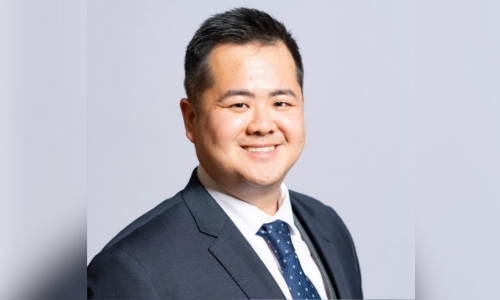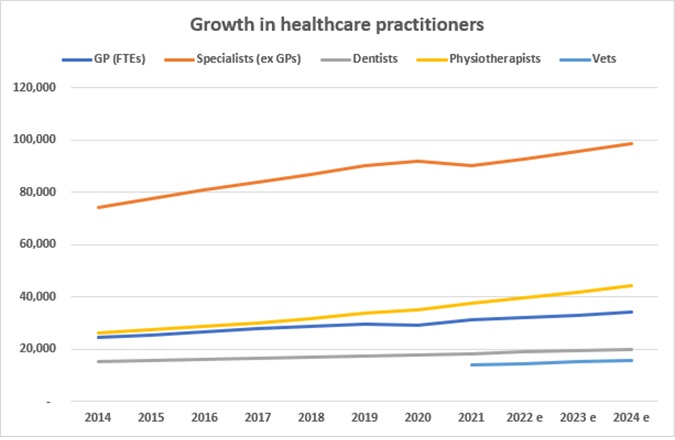At a time when many businesses are navigating cost-of-living pressures, healthcare professionals are thriving

Healthcare professionals are cementing their reputation as ideal finance customers. Many benefit from a high surplus income in a stable sector, making them attractive to lenders and generating compelling opportunities for brokers.
At a time when many Australian businesses are navigating cost-of-living pressures, healthcare professionals are thriving. Their highly-valued skills and status as essential services set them up to earn high surplus incomes – enabling them to borrow more.
Healthcare professionals are in perennial demand and run resilient, long-term businesses. The sector spans a broad range of professions including doctors in general practice (GPs), specialist doctors, physiotherapists, dentists, veterinarians and more.
Strong business fundamentals make the healthcare sector an attractive proposition for lenders and, consequently, a good opportunity for brokers.
Three reasons why healthcare professionals are attractive to brokers
Healthcare professionals can present rewarding opportunities for brokers. Here’s what’s attracting them:
1. Larger borrowings at a lower credit risk
Medical clients generally earn high surplus incomes that can be used to service large borrowings, according to Dhara Patel, Senior Business Banking Manager – Health at ANZ, and can benefit from a broker’s contacts and experience.
Adrian Lee-Nguan, Senior Business Banking Manager – Health at ANZ adds that “it's not uncommon for medical specialists to have a high-value residential property or portfolio of properties”.
Their businesses may also involve high-value assets. “Most medical specialists and dentists need equipment to practice. For specialists like endodontists, who regularly perform root canals and other procedures, fitting out a room in a clinic could cost over $600,000,” says Lee-Nguan (pictured below).

The credit risk for healthcare customers is also generally lower than for other businesses because they typically operate at a high standard of professional ethics and provide an essential service.
What’s more, they review their finance needs often.
“Given their larger and more complex financial needs, health customers typically review their finances about once every six months,” says Lee-Nguan.
2. They may refer other health businesses after a positive broker experience
Health professionals have strong relationships within their sector, partly because they tend to refer patients to each other.
“One of the key benefits of working with medical clients is that they're very well networked,” Patel says (pictured below).

“They go to conferences and share with other professionals what they're doing. So, if a broker does a good job, you may pick up more work through word of mouth. And if you provide one health professional with a positive customer experience, you will often keep getting more and more because they tend to refer each other.”
3. Loyal long-term relationships
“Healthcare customers are generally very loyal, but you need to build trust,” says Patel. “Many healthcare professionals work long hours doing very mentally draining work. They don't always have the time to check out special offers. Instead, they usually prefer working with people they can trust and build a longstanding relationship with.”
Lee-Nguan agrees. “All of my medico clients are extremely loyal and they treat me like family – they're really good clients.”
Growing opportunities for brokers
While COVID restrictions affected each of the health professions differently, in general, the sector demonstrated resilience and adaptability through the crisis.
By FY2024, it’s estimated the sector will grow to almost 213,000 practitioners.[1] While healthcare has a strong growth outlook, there are differences in how these opportunities are playing out in individual sub-sectors.
GPs face workforce shortages
As the GP sub-sector copes with workforce shortages, the RACGP is working to get more medical graduates into GP training.[2] GP services grew 10% year-on-year in FY2022.[3]
Data shown in figure 1 below and Services Australia[4] statistics point to favourable growth forecasts. To offset increased practice costs, GPs are also expanding the proportion of their appointments that are billed as private patients.[5]
Strong growth outlook for medical specialists
Appointments with specialist doctors rose 7% between FY2020 and FY2021.[6] This growth is expected to continue (see figure 1 below) given the popularity of non-GP specialties among medical graduates and increased demand from Australia’s ageing population.[7]
Physiotherapists and dentists resilient despite cost-of-living pressures
Spending on dental and physiotherapy services tends to be more discretionary than for other health services.
But post-pandemic, physiotherapists and dentists have seen patient volumes rebound,[8] despite cost-of-living pressures. Demand for dental services has been particularly strong recently, with services up 11.6% year-on-year in FY2023.[9] Physiotherapists saw lower but still positive service growth of 2.1% year-on-year in FY2023.[10]
Pandemic pet boom increases demand for vets
Vets experienced an uplift in demand when COVID-19 lockdown restrictions motivated many households to buy pets. Two years on, vet services remain in high demand.[11] However, recruiting a workforce on-call for long hours is an ongoing challenge for many practices.

Figure 1. Sources: Productivity Commission, Commonwealth Department of Health, Australian Veterinary Association, ANZ.
Multiple funding opportunities
Like other businesses, health professionals face challenges such as ongoing staff shortages.
Yet because health professionals have very resilient businesses compared to those of many other business owners, they have more growth and investment levers available to them. That’s good news for brokers operating in the sector. Here are five examples of where brokers are helping health professionals to achieve their investment objectives:
1. Funding the next generation of practice owners
“When older practitioners look towards retirement, there are opportunities to fund practitioners to buy into or acquire a practice,” Patel says. “I have a client who’s a dentist and he's planning to retire. A younger dentist has been working in the practice for the last couple of years and she’ll purchase that dental practice.”
Health professionals also purchase ‘patient bases’ – a medical practice’s patient list.
2. Owner-occupied commercial property
Patel notes that after a medical practice has been operating successfully for five to six years, the practice owners usually become interested in buying the practice premises. “Or they’ll purchase an old residential property, knock it down or renovate it to convert it into a practice, particularly dentists and GPs,” she says.
Lee-Nguan adds: “For practices that are fortunate to have adequate staffing, expansion is usually limited to the supply of commercial properties available. Some of my GP clients have had to purchase large residential properties to convert to a medical space, which can be a lengthy and expensive process to accommodate the new staff.
“It's not uncommon for physios to relocate to larger properties or purchase adjoining units to accommodate themselves and their team of allied health practitioners.”
3. Medical equipment and clinic fit-out
Starting up a clinic or fitting out a practice requires significant investment. Professions that rely on equipment, such as dentists, may spend $300,000 or more on a clinic, according to Lee-Nguan. “They usually purchase what's recommended by the consultant who helps them set up their clinics.”
4. Goodwill funding and goodwill redraw
Patel explains that, “sometimes a customer will use their own funds to set up a clinic, and then will want that money back. So we finance the reimbursement of those funds as a goodwill redraw.”
Health professionals can also access goodwill funding for expenses such as education.
These and other goodwill funding scenarios are covered by ANZ's specialised policies for health professionals, which may allow them to borrow more and use the goodwill of their practice as equity, subject to ANZ credit assessment.
5. Building personal wealth
Like other high-income professionals, health industry professionals often seek to build their personal wealth through property acquisitions, both residential and commercial.
The benefits are many for brokers who work with health professionals, says Patel. She suggests a broker’s first step to access these opportunities is to build relationships with accountants that specialise in medical clients.
“Most brokers are getting their referral from the accountant, so it is often worthwhile to develop relationships with those accountants who only or primarily deal with medical clients,” Patel says. “Most accountants would also tend to have a few clients in their book who are in the medical industry or the allied health sector.”
“Just like building any other network, you need to put yourself out there to connect with medicos,” says Lee-Nguan. “For example, either calling prospective clients through lead generation methods, or going to medical networking events.”
“You need to treat every inquiry like an opportunity to impress because health professionals have a tight-knit circle.
“Once you understand the health industry and have developed your network, you've got access to amazing clients.”
Learn more
To find out more about opportunities for brokers in Australia’s growing healthcare sector and the specialist support ANZ provides brokers, contact your ANZ business banker or click on this link.
This article is brought you by ANZ
This is general information. ANZ is not giving advice or recommendations, and we haven’t taken into account your customers’ needs, financial circumstances or objectives. You and your clients should carefully consider which ANZ products are appropriate for them and should seek appropriate independent advice (which may include property, legal, financial, taxation and accounting advice) before making any decisions, investing, or acting on it. Terms and conditions, fees and charges, and credit approval and eligibility criteria apply to ANZ products.
[1] ANZ Health, the 213,000 figure is a projection of the total number of GPs (FTEs), specialists (ex GPs), dentists, physiotherapists and vets based on data from the Productivity Commission, Department of Health and Aged Care, Australian Veterinary Association.
[2] News GP, RACGP pledges to simplify IMG processes, 1 August 2023, accessed 24 November 2023.
[3] Services Australia, Reports and statistics.
[4] Services Australia, Reports and statistics.
[5] Department of Health, MBS Quarterly Statistics - Year to Date Dashboard (health.gov.au); News GP, ‘The result of years of neglect’: Bulk billing freefall continues, 17 April 2023, accessed 24 November 2023.
[6] Services Australia Reports and statistics.
[7] Australian Institute of Health and Welfare (AIHW): Older Australians web report last updated 28 June 2023. There were 14.6 million specialist attendances processed through Medicare in 2019–20 for people aged 65 and over (46% of specialist attendance claims) (Services Australia 2021). Cf Australia's Health 2016, 6.17 Health care use by older Australians. Older people accounted for 12.4 million out of 29 million specialist attendances (43%) claimed through Medicare in 2014–15.
[8] APRA private health insurance statistics.
[9] Services Australia Reports and statistics.
[10] Services Australia Reports and statistics.
[11] Animal Medicines Australia, Pets and the Pandemic, 2021; and high demand still per IBIS World Veterinary Services in Australia June 2023, "Average vet wages remain low despite demand for veterinary services surging" (noting the scale of growth in practitioners isn't reflecting actual demand for services).



